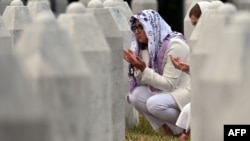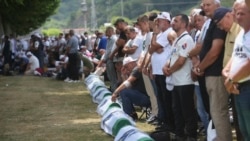SREBRENICA, Bosnia-Herzegovina -- Every year, Nermin Catic returns to Bosnia from his home in Sweden to open up his family’s old house, which now stands empty.
He’s been waiting three decades for his brother’s remains to be found. His mother spent the rest of her life trying to locate them, only to die without answers.
“How long can hope endure? I fear I will lose hope before I move on to the next world,” he told RFE/RL’s Balkan Service.
No body. No justice. No closure. It's a story Catic, and thousands of other families in Bosnia continue to endure 30 years after Bosnian Serb forces killed more than 8,000 Bosnian Muslim men and boys in the town of Srebrenica in what is Europe's only acknowledged genocide since World War II.
The scale and brutality of the July 1995 killings in Srebrenica -- an enclave under Bosnian Muslim control where tens of thousands had fled for safety from Bosnian Serb forces -- shocked the world and did lead to some high-profile convictions at the International Criminal Tribunal for the Former Yugoslavia (ICTY), also known as the Hague Tribunal.
These included Bosnian-Serb military commander Ratko Mladic, convicted of war crimes, crimes against humanity, and genocide in 2017, and sentenced to life in prison.
But this was just the tip of the iceberg.
And as the world marks the 30th anniversary of the Srebrenica massacre, those who worked to bring the perpetrators justice say there are many lessons to be learned.
Lessons that need to be learned if justice is to be done for families of the victims of Srebrenica, and in future for those in countries such as Ukraine, which has witnessed numerous atrocities in more than three years of trying to repel invading Russian troops.
Little Justice For Srebrenica Victims
“Very few people [in Bosnia] were satisfied with the judicial system,” said Janine di Giovanni, CEO of The Reckoning Project, which brings together journalists and lawyers to gather evidence and bring war criminals to court.
“The people on the ground that did the killing, that dug the graves, that murdered and raped and destroyed lives and families and ripped apart the society of Srebrenica -- most of them are still walking around,” she told RFE/RL.
In all, the Hague Tribunal convicted 18 people -- five of whom were sentenced to life sentences -- for genocide and other crimes at Srebrenica.
Geoffrey Nice, who led the prosecution of former Yugoslav leader Slobodan Milosevic at The Hague, also feels the judicial process fell short.
“I think overall the conclusion may well be that justice has not been met or not been met in the way it should have been,” he told RFE/RL.
“History will not judge the process kindly, but it may assess it with understanding. The two tribunals, for Rwanda and former Yugoslavia...were brand new, with nothing by way of a precedent."
Can The ICC Make A Difference?
The situation is different today, with the International Criminal Court (ICC) established as a permanent body to replace ad hoc tribunals in 2002.
It also appears to be determined to show it has teeth, issuing war crimes indictments against Russian President Vladimir Putin and Israeli Prime Minister Benjamin Netanyahu.
But Nice is skeptical that these will ever lead to convictions, arguing that the conflicts in Ukraine and Gaza will probably end with political agreements.
“The settlement would almost inevitably include, as clause one, in either case, that President Putin or Prime Minister Netanyahu will not be tried for any alleged offense,” he said.
Nice added that intense criticism of the ICC by the Trump administration may also weaken its ability to function – and that a far better approach would be to focus on using national courts.
Indeed, Bosnian courts have handed down the more verdicts for genocide and other crimes in Srebrenica than the Hague Tribunal. So far, they have convicted 27 former members of the Bosnian Serb forces for crimes committed at Srebrenica, including 14 for genocide.
Di Giovanni, who reported from Srebrenica as a journalist at the time of the genocide, agreed that national courts could play a key role.
“Ukraine is different because Ukraine has, first of all, had a very substantial judicial system,” she said.
“The local courts in Ukraine are probably more substantial because of the federalization of Bosnia after the war. I mean, it's one of the most dysfunctional systems in the world.”
Ukrainian authorities say they have issued 679 war crimes indictments and have made 188 convictions.
This work has benefitted from expertise and experiences gained in international institutions such as the ICC.
“A lot of the prosecutors working in Ukraine today were involved with [international justice] in Cambodia and Sierra Leone. We’ve learned a lot in the 30 years since Srebrenica,” said Di Giovanni.
Sources Of Hope
Another development in that time is the use of universal jurisdiction, in which crimes in one country are ruled upon elsewhere.
In June, a German court gave a life sentence to a Syrian doctor, Alaa Mousa, who tortured prisoners under the regime of President Bashar Al-Assad.
In April, Di Giovanni’s Reckoning Project helped a Ukrainian man bring charges at an Argentinian court against identified and unidentified Russians for torturing him.
She said the key lesson learned was the importance of gathering evidence early – and that this was already being acted upon in Ukraine.
“We gather evidence of war crimes while the war is still going on.
And that's very different from the time it took in 1995...Testimonies weren't taken until long after the war ended.”
These are sources of hope for justice in places such as Bucha, Ukraine, where Russian forces killed hundreds of civilians. Ukraine has asked the ICC to investigate suspected war crimes.
But they are probably too late to help Nermin Catic in Srebrenica.
His brother, Nihad “Nino” Catic was a journalist who filed the final report from Srebrenica before the town was overrun by Bosnian Serb forces.
“Srebrenica is turning into the biggest slaughterhouse. The dead and wounded keep arriving at the hospital,” he said in his last report before disappearing.
“Is there anyone in the world who can come and witness the tragedy unfolding in Srebrenica and its people?”
Nino joined thousands who fled into the hills, hoping to reach safety nearly 100 kilometers away, but was never seen again.
Thirty years later, seven more bodies are being laid to rest on July 11 in Srebrenica.
The families for some 1,200 Srebrenica victims whose bodies are still missing, however, still seek justice. Just like Nermin Catic.
More than 1,000 km east, Ukrainians are looking on and wondering if they will avoid the same fate.













